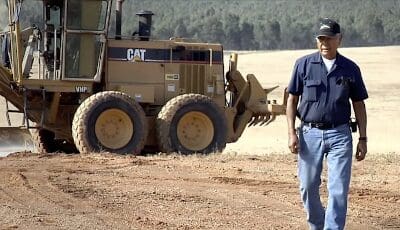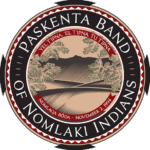The Everett Freeman Story
The Journey to Restore a Sovereign Nation
Everett Freeman's Promise to Restore the Tribe and Secure its Rightful Lands
As a young man, the Nomlaki man made a promise to his elder uncles that he would someday reclaim the land that had been taken from the Nomlaki people. Decades later, he did just that.
Born in 1931 in Butte City, California, Freeman was influenced by his grandfather — a medicine man named Andrew Freeman — and his uncles as they traveled the state looking for work during the Dust Bowl years. While Everett didn’t finish high school, he taught himself mathematics, reading, and writing.
He proudly enlisted in the U.S. Navy in 1949, fighting for a country whose government would later strip his people of their native heritage and sovereignty. Still, Everett refused to leave his native land and would later go to work with the Bureau of Indian Affairs (BIA), leading projects to build new infrastructure for nearby Rancherias with U.S. government funds.
In 1954, Everett married Pat Hoaglin and spent the next three decades as a family man, raising five children and continuing his work with the BIA until his retirement in 1990. It was then that he began his efforts to regain ownership of the Tribe’s aboriginal territory.
While the effort seemed impossible, Everett was undaunted and dedicated his retirement years to fulfilling the promise of reunification. He was a natural leader who understood the historical, governmental, and Tribal elements at play in the convoluted treaties that left broken promises scattered across the hills of northern California.

Committed to the cause, he connected with Nomlaki members across the country to raise awareness of the effort. Everett, his family, and his friends set up taco and snow cone concession stands at events and traditional gatherings known as Big Times and Pow Wows to raise funds that could support the effort. Word spread of this goal, and it grew into a movement.
Soon, Everett was making trips to Washington D.C. to speak in front of the U.S. Congress on behalf of the Tribe. In Sacramento, he worked with state government representatives to draft a bill in support of the effort and collaborated with California Congressman Vic Fazio to sponsor the Paskenta Band Restoration Act, which was signed into law in 1994. Finally, he had fulfilled the promise he made to his grandfather and uncles decades earlier. The Tribe had its status back.
But that wasn’t the end of his work. For the next 16 years, Everett would continue to work on building the sovereign nation, serving as Chairperson of the Paskenta Band of Nomlaki Indians, organizing the community, and, in 2000, buying back 2,000 acres of their aboriginal lands.
His commitment extended beyond the Nomlaki community to its surrounding neighbors and land, with a keen understanding that cooperation and mutual support would raise the standing of all. After he died in 2010, the main road on Paskenta lands was renamed Everett Freeman Way to honor his efforts and share his story.
